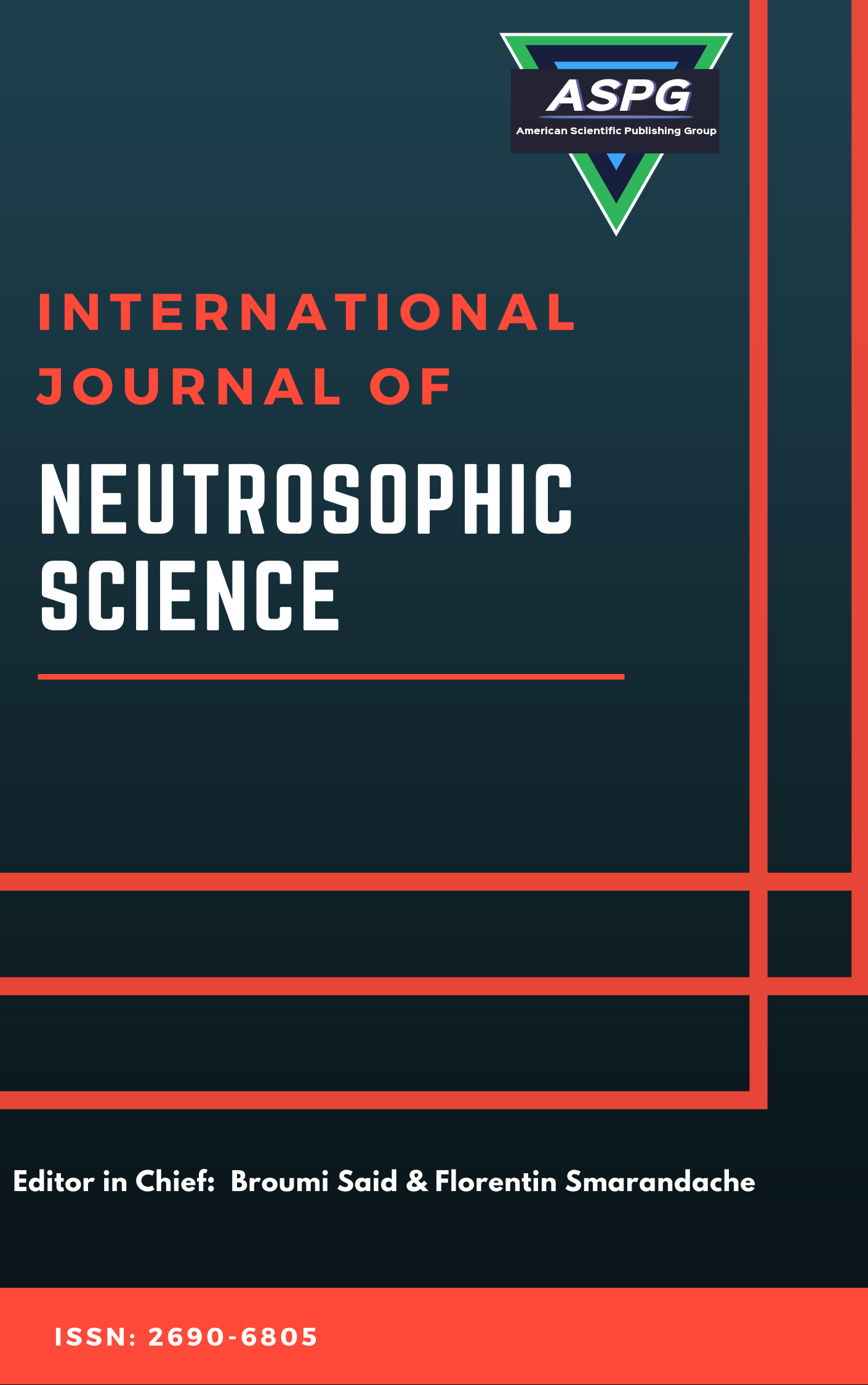

Volume 23 , Issue 4 , PP: 426-438, 2024 | Cite this article as | XML | Html | PDF | Full Length Article
Fadoua Kouki 1 *
Doi: https://doi.org/10.54216/IJNS.230435
Financial technology (Fintech) is paramount in driving advanced technologies, economies, society, and several other sectors. Smart Fintech is the new-generation Fintech, primarily stimulated and endowed by compuational technology. Smart Fintech syndicates DSAI and renovates economies and finance for dynamic, smart, customized, automated services and systems, economies and financial companies, and the industry. The strength and development of the country’s economies are assessed by the correct forecasting. Financial crisis prediction (FCP) has the substantial consequence on the economies. Previous studies mainly emphasise statistical, DL, and ML methodologies for predicting the financial well-being of the business. Therefore, this article develops a new Arithmetic Optimization Algorithm with Adaptive Neuro-Fuzzy Interference System (AOA-ANFIS) technique for Predicting Financial Crisis. The presented AOA-ANFIS technique aims to predict the presence of financial crises or not. The model incorporates three major elements: Arithmetic Optimization Algorithm (AOA) for feature selection, Adaptive Neuro-Fuzzy Inference System (ANFIS) as the classification algorithm, and Bat Optimization Algorithm (BOA) for parameter tuning. The AOA feature selection model effectively detects the important attributes from a large proportion of financial indicators, augmenting the model's prediction capability while decreasing computational difficulty. Subsequently, the ANFIS classifier exploits the features selected for capturing the intricate non-linear relations intrinsic in financial data, permitting accurate crisis calculation. Additionally, the BOA parameter tuning model augments the ANFIS model's parameters, ensuring robustness and optimum performance. Experimental outcomes on varied financial databases validate the higher efficiency of the AOA-ANFIS technique over underlying processes, demonstrating its effectiveness in forecasting financial crises with great reliability and precision.
Financial Crisis Prediction , Arithmetic Optimization Algorithm , Fintech , ANFIS , Deep Learning , Machine Learning
[1] Khuwaja, P.; Khowaja, S.A.; Dev, K. Adversarial learning networks for fintech applications using heterogeneous data sources. IEEE Internet Things J. 2021, 10, 2194–2201.
[2] Bhattacharya, R.; Krishna, S.H.; Haralayya, B.; Nagpal, P. Modified Grey Wolf Optimizer with Sparse Autoencoder for Financial Crisis Prediction in Small Marginal Firms. In Proceedings of the 2023 Second International Conference on Electronics and Renewable Systems (ICEARS), Tuticorin, India, 2–4 March 2023; pp. 907–913.
[3] Bazarbash, M. Fintech in Financial Inclusion: Machine Learning Applications in Assessing Credit Risk; International Monetary Fund: Washington, DC, USA, 2019.
[4] Uthayakumar, J.; Metawa, N.; Shankar, K.; Lakshmanaprabu, S.K. An intelligent hybrid model for financial crisis prediction using machine learning techniques. Inf. Syst. e-Bus. Manag. 2020, 18, 617–645.
[5] Ceron, B.M.; Monge, M. Financial Technologies (FINTECH) Revolution and COVID-19: Time Trends and Persistence. Rev. Dev. Financ. 2023, 13, 58–64.
[6] Liu, L.; Chen, C.; Wang, B. Predicting financial crises with machine learning methods. J. Forecast. 2022, 41, 871–910.
[7] Dominic, D.P.; Adimoolam, M.; Balamurugan, N.M. Share Market Data Prediction Strategies Using Deep Learning Algorithm. Recent Adv. Comput. Sci. Commun. 2019.
[8] Bluwstein, K.; Buckmann, M.; Joseph, A.; Kapadia, S.; ¸Sim¸sek, Ö. Credit growth, the yield curve and financial crisis prediction: Evidence from a machine learning approach. J. Int. Econ. 2023, 103773.
[9] Balmaseda, V.; Coronado, M.; de Cadenas-Santiagoc, G. Predicting Systemic Risk in Financial Systems Using Deep Graph Learning. Intell. Syst. Appl. 2023, 19, 200240.
[10] Tyagi, S.K.S.; Boyang, Q. An intelligent internet of things aided financial crisis prediction model in fintech. IEEE Internet Things J. 2021, 10, 2183–2193.
[11] Wu, C., Jiang, C., Wang, Z. and Ding, Y., 2024. Predicting financial distress using current reports: A novel deep learning method based on user-response-guided attention. Decision Support Systems, 179, p.114176.
[12] Katib, I., Assiri, F.Y., Althaqafi, T., AlKubaisy, Z.M., Hamed, D. and Ragab, M., 2023. Hybrid Hunter–Prey Optimization with Deep Learning-Based Fintech for Predicting Financial Crises in the Economy and Society. Electronics, 12(16), p.3429.
[13] Muthukumaran, K. and Hariharanath, K., 2022. Deep learning enabled financial crisis prediction model for small-medium sized industries. Intelligent Automation & Soft Computing, 35(1), pp.521-536.
[14] Rostamian, A., 2024. Applications of Deep Learning Models in Financial Forecasting (Doctoral dissertation, University of Essex).
[15] Yang, Y., Qin, Y., Fan, Y. and Zhang, Z., 2023. Unlocking the Power of Voice for Financial Risk Prediction: A Theory-Driven Deep Learning Design Approach. Mis Quarterly, 47(1).
[16] HongXing, Y., Naveed, H.M., Memon, B.A., Ali, S., Haris, M., Akhtar, M. and Mohsin, M., 2024. Connectedness between currency risk hedging and firm value: A deep neural network-based evaluation. Computational Economics, 63(2), pp.599-638.
[17] Ren, Y., Zhu, Y., Zhu, H. and Jiang, J., 2023. Prediction of Financial Crisis Events Using Graph Neural Network Model: Based on Inter-Industry Spillover Information. Available at SSRN 4390760.
[18] Abualigah, L., Diabat, A., Mirjalili, S., Abd Elaziz, M. and Gandomi, A.H., 2021. The arithmetic optimization algorithm. Computer methods in applied mechanics and engineering, 376, p.113609.
[19] Jithendra, T., Khan, M.Z., Basha, S.S., Das, R., Divya, A., Chowdhary, C.L., Alahmadi, A. and Alahmadi, A.H., 2024. A novel QoS prediction model for web services based on an adaptive neuro-fuzzy inference system using COOT optimization. IEEE Access.
[20] Majrashi, M.A.A., Alamoudi, J.A., Alrashidi, A., Algarni, M.A. and Alshehri, S., 2024. Nonsteroidal anti-inflammatory drug solubility optimization through green chemistry solvent: Artificial intelligence technique. Case Studies in Thermal Engineering, 53, p.103767.
[21] https://archive.ics.uci.edu/ml/datasets/statlog+(german+credit+data)
[22] http://archive.ics.uci.edu/ml/datasets/statlog+(australian+credit+approval)